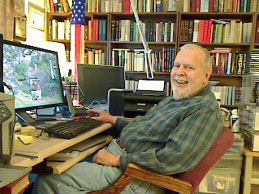Home >> Ed's Story
Ed's Story
Arthur "Ed" Wall is from Orland Park, Illinois, USA. This is his story:
My wife and our three children made life a joy, most of the time, and my job added to the fun. What could be more fun that being managing editor of Honolulu's morning newspaper, then editor in chief of a worldwide church news service?
Around the time I tuned 50 I began to walk with an occasional lurch, like Charlie Chaplin, and sometimes I used a walking stick. Doctors could not account for the unsteady footwork and I simply accepted it.
| |  |
A few years later, while I was talking with friends in a flat parking lot, I became dizzy and lost my balance. My doctor told me it was just part of getting older, although I was only in my 60s.
I traded the walking stick for a cane. Then my daughter, a doctor, made an appointment for me with a noted neurologist, whose first examination established, to my surprise, that I could not walk a straight line. A long series of tests began, and one by one they ruled out various ailments, until after several months the neurologist diagnosed olivopontocerebellar atrophy (OPCA), often called multi-systems atrophy (MSA), which he described as a form of parkinsonism. Note the ism. It is a rare disease with, so far, no cure.
As the dizziness became more intense, the aches more frequent, the swallowing more tricky, the lurches more risky and the gasps more noisy, I advanced from cane to walker, then to a rollator and eventually to a power chair for indoors and a secure four-wheel power scooter for sidewalks. I celebrated my 87th birthday seated at my computer, which is my best medicine. Email and Google keep me in touch with the world.
There's a lot to enjoy. I'm blessed with a loving daughter and son-in-law who live just one mile from the condo I share with Tom, an elderly cat, and my blessings include two sons and their spouses, six grandkids and lots of good OPCA/MSA friends I've met via the Internet. OPCA/MSA is a formidable adversary, so the afflicted patients and caregivers have to be more formidable than a mere disease.
|
|
|




